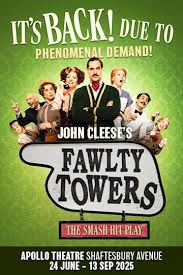Reviving the Laughter: Fawlty Towers Play Hits the Stage

Introduction
The revival of the Fawlty Towers play has reignited interest in one of Britain’s most beloved television comedies. Created by John Cleese and Connie Booth, the original sitcom aired from 1975 to 1979, showcasing the antics of Basil Fawlty, played by Cleese, at a dysfunctional hotel. This stage adaptation not only caters to longstanding fans but also introduces the show’s unique brand of humour to newer generations. The importance of this revival lies in its potential to connect audiences through shared laughter, as theatre struggles to maintain relevance in a digital age.
Details of the Adaptation
The theatrical adaptation of Fawlty Towers, directed by David J. O’Grady, captures the chaotic essence of the original series while adding live elements that enhance the comedic experience. The play premiered at the West End in London, receiving rave reviews for its cast’s ability to embody the original characters. With Basil, Sybil, and Manuel at the forefront, the production stays true to the comic timing and sharp wit that made the show a classic.
Over the past few months, theatres have seen a surge in attendance, with audiences eager to escape the reality of everyday life through humour. Reports indicate that ticket sales for the Fawlty Towers play have exceeded initial projections, leading to extensions of the run in various cities across the UK. The combination of nostalgia and the live theatre experience has proven to be a successful formula.
Significance and Future Prospects
The success of the Fawlty Towers play illustrates a significant shift in audience preferences, highlighting the resurgence of traditional theatre amid evolving entertainment landscapes. As younger viewers discover the charm of Basil’s misadventures, it renews interest in classic comedies and paves the way for more adaptations from iconic television series.
In conclusion, the Fawlty Towers play serves not only as a tribute to the original series but as a reminder of the timeless nature of comedy. As verified data shows increased ticket sales and positive critical reception, it is likely that we will see more adaptations and revivals of classic comedies in the years to come. The laughter evoked by such performances proves necessary, reinforcing the cultural significance of theatre in bringing joy to audiences during tumultuous times.









